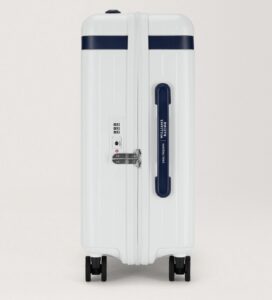

When Reformation and Jimmy Fairly joined forces for their debut eyewear capsule, it was a quiet revolution—elevating affordable sunglasses beyond fast fashion and into the realm of meaningful style. That first collection proved that the romance of Parisian design and the rigor of sustainable production weren’t mutually exclusive. Now, with their second outing, the brands double down on their shared ethos: eyewear for a future that sees clearly, priced within reach, but styled with purpose.
This second chapter from Reformation x Jimmy Fairly isn’t simply a follow-up—it’s a declaration. An assertion that sustainability, style, and access can occupy the same space. Priced at under $200, every piece sidesteps the bloated markups that plague the luxury eyewear sector. But what’s more remarkable is what that price tag includes: European craftsmanship, Parisian design language, and fully biodegradable materials. At a glance, they may look like elevated streetwear essentials. But in hand, they are heirlooms for a greener world.
Luxury Reimagined: Beyond the Price Tag
In the traditional luxury playbook, prestige is sold by the ounce—often through weighty acetate frames, Italian logos, or celebrity campaigns. The Reformation x Jimmy Fairly collaboration rewrites this. The frames are still bold. The silhouettes still flirt with vintage cool. But they’re lighter, cleaner, and carry less baggage—both literally and ideologically.
Unlike petroleum-based plastic frames that dominate the eyewear market, every model here is carved from 100% plant-based bio-acetate. This material isn’t just a marketing gimmick. Derived from cellulose and natural plasticizers, bio-acetate is biodegradable, meaning it can break down organically over time instead of joining the pile of microplastics choking the planet. But that green halo doesn’t compromise feel or form. These frames still have that dense, high-gloss finish you’d expect from $500 pieces.
And that’s the pivot point: luxury not as a function of elitism, but of responsibility. These sunglasses don’t whisper status—they express it through values.
Aesthetics Anchored in Memory, Movement, and Paris
The visual identity of the collection is unmistakably Parisian. There’s a cinematic languor to the lenses—models that nod to 1970s film noir heroines, or the type of sun-dappled glamour worn along the Rive Gauche. Think Riviera-ready cat eyes, rounded retro specs, and dramatic rectangular silhouettes that feel straight from a Godard frame. Each style walks a precise line between modern sharpness and retro softness, evidence of a designer’s hand that understands restraint as a luxury.
All design was orchestrated in Jimmy Fairly’s Paris atelier, a setting known less for fast-paced production and more for deliberate craft. It’s where the city’s quiet minimalism and flair for boldness meet, yielding eyewear that slips seamlessly into a Reformation wardrobe of draped linens, ankle boots, and flowing day dresses.
The colorways tell a deeper story. Earth tones dominate—amber, tortoise, mossy greens, and soft blushes—mirroring Reformation’s aesthetic universe of grounded elegance. They feel at home in nature, under sun-filtered leaves, or beside a woven handbag. Yet there’s a futuristic undercurrent here too, with icy transparents and smoky grays introducing a touch of digital sleekness, as if to say: yes, you can be eco-conscious and still look plugged into the now.
Conscious Craft: The French Lens on Sustainability
In a market flooded with greenwashing and vague pledges, the integrity of this collaboration comes from its specificity. The eyewear isn’t just marketed as sustainable—it’s traceably so. The bio-acetate frames are sourced through verified suppliers, built in workshops committed to low-waste production. Even the packaging is pared down and recyclable, embodying a less-is-more philosophy that defines both brands.
Reformation has long treated sustainability as central to its brand identity, not an accessory to it. Their digital footprint-tracking tools, transparent supply chain communication, and focus on low-impact fabrics have earned them a cult following among climate-conscious fashionistas. Jimmy Fairly, meanwhile, operates under a “Buy One, Give One” model—donating a pair of glasses to someone in need for every pair sold. Their mutual alignment makes this collaboration feel organic, not opportunistic.
By championing bio-acetate over traditional plastics, they eliminate a common contradiction in fashion: the aesthetic of nature rendered through toxic, polluting processes. Instead, the collection embodies a holistic vision, where what we wear—and how it’s made—matters just as much as how it looks.
Cultural Timing: The Shift to Conscious Accessory Design
There’s a broader cultural current at play here. As fashion pivots away from the excesses of fast turnover and seasonal trend-chasing, accessories like sunglasses are increasingly becoming sites of both identity and sustainability. Consumers want more than just a good look—they want a good story, a reason to believe their purchase supports a better kind of future.
This second Reformation x Jimmy Fairly collection hits right at the intersection of that demand. It’s affordable without being disposable. It’s trendy without being transient. And it’s ethical without aesthetic compromise. The frames are built to last—not just physically, but emotionally, with a design that doesn’t lean too hard into any one fashion moment. They’ll still feel relevant next season, and likely the one after that.
This kind of timelessness is sustainability’s secret weapon. Because when style endures, waste shrinks.
The Democratization of Good Design
What sets this collaboration apart isn’t just the materials or even the design. It’s the refusal to gatekeep good taste and good ethics behind a $600 barrier. At under $200, the entire line is within arm’s reach of style-conscious shoppers who might not usually browse eco-luxe boutiques. It’s a radical gesture in a fashion economy that still positions sustainability as a luxury only the wealthy can afford.
That affordability, however, doesn’t signal a retreat in quality. It represents innovation. Streamlined manufacturing, efficient sourcing, and a deliberate avoidance of bloat have allowed this collaboration to hit a rare sweet spot—where ethics, aesthetics, and economics coexist.
And as brands worldwide grapple with the challenge of scaling sustainability without alienating customers, Reformation and Jimmy Fairly offer a working blueprint. It’s not about compromise. It’s about vision, alignment, and trust in consumers’ desire to do better when given the tools.
Impression
In a decade saturated with collabs, few strike the kind of resonance that Reformation x Jimmy Fairly achieves. This isn’t just another co-branded drop chasing trend waves. It’s a serious—albeit stylish—attempt to rewire how we view luxury, price, and responsibility.
By designing through the lens of clarity—environmental, cultural, and aesthetic—this second collection frames the future in a new light. One where seeing well means seeing further. Where accessories aren’t just accents to outfits, but mirrors of our values.
No comments yet.








